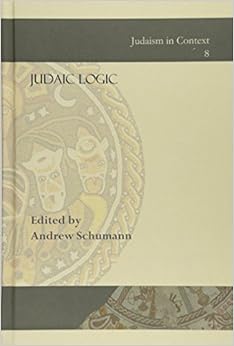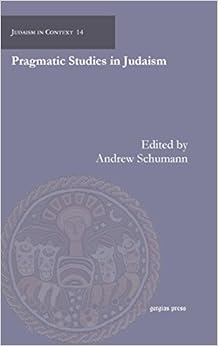contributions on any aspect of human sciences such as...
read more...
The following three edited volumes are devoted to logical and pragmatic studies in Judaism

A. Schumann (ed.), Judaic Logic. Gorgias Press, 2010.
Judaism differs considerably from other theistic religions. One of the main features is that Jewish religious laws are not dogmatic but based on specific legal reasoning. This reasoning was developed by the first Judaic commentators of the Bible for inferring Judaic laws from the Pentateuch. The book is about Judaic reasoning from the standpoint of modern logic. Its first goal is to define Judaic logic. This logic was aimed to be a methodology for deducing religious laws. The idea that this methodology can be viewed as original logic that is not less deductive than Aristotle’s logic did not emerge until the Late Middle Ages. At that time Medieval Hebrew works about Judaic reasoning were influenced by Arabo-Islamic philosophy as well as by Latin Scholastic logic. In this volume we discuss different forms of influence of the Aristotelian logic on developing the Talmudic methodology. Then we aim to sketch semantics for the Judaic reasoning, explicating Talmudic case study and Rabbinic situation analysis to develop general approaches to formalizing Judaic logic. This consideration of Judaic logic has relevance for modern logic and analytic philosophy and may be compared with the contribution made by the formalization of Ancient Greek logical systems to 20th-century logic and language philosophy.

The analysis of Judaic logic and logical assumptions in Kabbalistic calculations can make a considerable contribution to the development and understanding of logical and computation theories linked with massive-parallel computing. In this volume, we consider a historical context of Judaic logic as well as various possible versions of its formalization. In particular, in the volume a general logical-philosophical characteristic of Judaic reasoning is offered (Norman Solomon), Judaic receptions of Aristotle's dialectics are traced (Aviram Ravitsky, Mauro Zonta), the set-theoretic assumptions used in the Talmud are formalized (Michael Abraham, Dov M. Gabbay, Gadi Hazut, Yosef E. Maruvka and Uri Schild), the probability-like reasoning of the Talmud is formalized (Dov M. Gabbay and Moshe Koppel), a theory of massive-parallel proofs is sketched (Andrew Schumann), an explication of logical-philosophical ideas of some Kabbalistic authors is proposed (Yoel Matveyev).

A.Schumann (ed.), Pragmatic Studies in Judaism. Gorgias Press, 2013.
This book is the first attempt to apply formal pragmatics to Judaic studies as a discipline as well as within the broader discipline of cultural studies, reconstructing the pragmatic approach in Judaism and defining some of the pragmatic limits assumed in the Torah. It is a continuation of previous work considering Judaic reasoning from the standpoint of analytic philosophy and logic. The present volume aims to explicate the Judaic pragmatic point of view with an emphasis on logic, political studies, ethics, and speech act theory, and the contributions encompass several themes and objectives of pragmatic studies.
Андрэй ШУМАН. АШКЕНАЗСКІЯ ГАБРЭІ ЯК АДЗІН З КАРЭННЫХ НАРОДАЎ БЕЛАРУСІ.
Андрэй ШУМАН. ГІСТОРЫЯ ХАСІДЫЗМУ Ў БЕЛАРУСІ.
Андрэй ШУМАН. ЮДАІЗМ І ВЕЧНЫЯ САЦЫЯЛЬНЫЯ ТЭХНАЛОГІІ.
Article in Russian:
Andrew Schumann. "Judaism and Syrian Christianity, Is This a Loss of Sources?". Философия и социальные науки: Научный журнал. 2011. № 1, 58-63.
Article in Belarussian:
Andrew Schumann. "Ашкеназскія габрэі як адзін з карэнных народаў Беларусі". Arche. 2009. № 8.
In Russian-speaking media:
Принципы иудейской логики могут быть положены в основу искусственного интеллекта.
Еврейская логика и современная информатика.